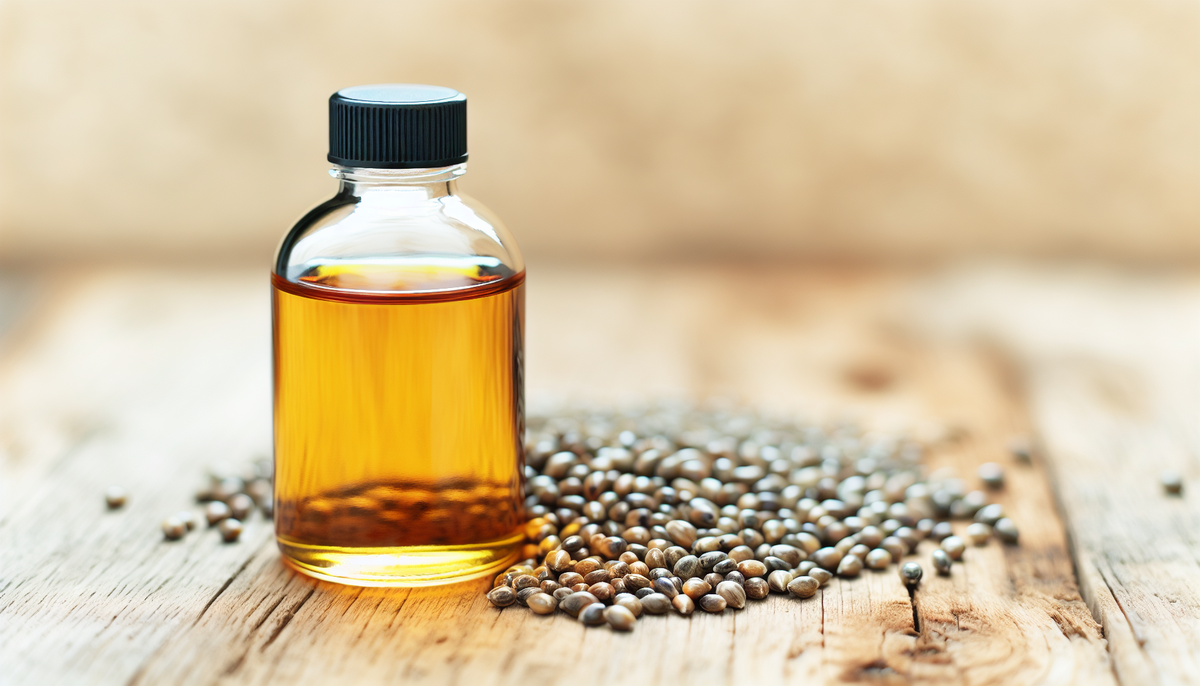The Impact of Hemp Seed Oil on Acne
Written by: Hunter Podell, Subject Matter Expert and Website Founder
Published: March 15, 2024; Last updated: April 6, 2024
- 1. Key Takeaways
- 2. Harnessing Hemp Seed Oil for Acne Relief
- 2.1 Tackling Inflammation with Hemp Seed Oil
- 2.2 Regulating Sebum with Nature’s Touch
- 2.3 A Noncomedogenic Natural Solution
- 3. The Synergy of Fatty Acids in Acne Treatment
- 3.1 Omega Balance: The Key to Clearer Skin
- 3.2 Repair and Prevent: The Role of Linoleic Acid
- 4. Incorporating Hemp Seed Oil into Your Acne-Fighting Routine
- 4.1 Direct Application: A Few Drops Go a Long Way
- 4.2 Blending with Other Natural Oils
- 4.3 Dietary Hempseed Oil: An Inside-Out Approach
- 5. Debunking Myths: Hemp Seed Oil vs. CBD Oil in Acne Care
- 5.1 Understanding the Source: Cannabis Sativa Plant Origins
- 5.2 THC Content and Skin Care Implications
- 6. Precautions and Considerations When Using Hemp Seed Oil
- 6.1 Sensitivity Check: Performing a Patch Test
- 6.2 Recognizing and Addressing Allergic Reactions
- 7. Summary
- 8. Frequently Asked Questions
- 8.1 Is hemp seed oil good for acne?
- 8.2 Is hemp seed oil pore clogging?
- 8.3 Can I leave hemp oil on my face overnight?
- 8.4 How do I use hemp seed oil for acne treatment?
- 8.5 What’s the difference between hemp seed oil and CBD oil?
- 9. References
If you’re questioning whether acne hemp seed oil can be your ally in achieving more transparent skin, you’re not alone. Hemp seed oil might offer a respite from acne with its noncomedogenic nature and sebum-regulating abilities. Aimed at those seeking more transparent skin, this piece cuts through the noise to explain the real impact of hemp seed oil on acne and how to apply it for the best results.
Key Takeaways
Hemp seed oil is beneficial for acne-prone skin due to its anti-inflammatory properties, ability to regulate sebum production, and noncomedogenic nature that prevents clogged pores.
Essential fatty acids in hemp seed oil, particularly the balanced ratio of Omega-3 to Omega-6 and linoleic acid, help reduce inflammation, strengthen the skin barrier, and maintain skin hydration, which can alleviate acne symptoms.
Hemp seed oil can be applied topically, mixed with other natural oils, or taken orally to improve skin health. However, proper patch testing for allergies should be conducted before widespread use.
Harnessing Hemp Seed Oil for Acne Relief

Living with acne-prone skin can be a constant battle, with each new blemish as a reminder of the ongoing struggle. A natural remedy like hemp seed oil could be the key to winning this battle. This wonder oil, derived from hemp plant seeds, has been hailed for its ability to treat various skin conditions, including acne. But what makes hemp seed oil good for acne?
Firstly, hemp seed oil is a rich source of essential fatty acids and other beneficial antioxidants that can help soothe inflammation, a common symptom of acne. Secondly, it can regulate sebum production, preventing an excess oil build-up that often leads to acne. Lastly, it is noncomedogenic, meaning it won’t clog your pores, reducing the likelihood of acne breakouts. Let’s delve deeper into these benefits.
Tackling Inflammation with Hemp Seed Oil
When dealing with acne, inflammation is often the culprit. The accompanying redness and swelling can be as distressing as the blemishes and even lead to acne scars. Hemp seed oil, however, is equipped with a potent anti-inflammation arsenal: essential fatty acids.
The anti-inflammatory effects of hemp seed oil can be attributed to its rich content of gamma-linoleic acid (GLA) and omega-3 fatty acids. These essential fatty acids help to soothe inflamed skin, reducing redness and irritation, thus making hemp seed oil a valuable ally for those battling acne. Scientific studies further support this, indicating that skin hemp seed oil possesses anti-inflammatory properties and the potential to decrease skin redness. ³
Regulating Sebum with Nature’s Touch

Sebum, the oil our skin produces, is necessary for keeping our skin hydrated and healthy. However, too much of it can lead to clogged pores and acne breakouts. This is where hemp seed oil comes into play.
With its ability to help regulate sebum production, hemp seed oil strikes a balance, preventing an overproduction of sebum that can lead to acne. An imbalance in sebum production is often the culprit behind those pesky breakouts. Hemp seed oil mitigates the risk of acne formation by regulating sebum levels, thus reducing the chance of pore clogging.
A Noncomedogenic Natural Solution
The thought of applying oil to acne-prone skin might seem counterintuitive. After all, wouldn’t it exacerbate the problem by clogging pores? Not if you’re using hemp seed oil.
Hemp seed oil, derived from hemp plant seeds, has the following benefits for your skin:
It won’t clog your pores due to its noncomedogenic nature.
This characteristic makes it a safe and effective option for acne-prone skin.
It is suitable for both oily and dry skin types.
By not clogging pores, hemp seed oil prevents the formation of new blemishes, reducing the risk of acne breakouts. This is supported by scientific evidence, making hemp seed oil a reliable and effective acne treatment.
The Synergy of Fatty Acids in Acne Treatment

Despite their unappealing term, ‘fatty acids’ are vital for skin health. Compounds such as α-linolenic acid and gamma-linolenic acid in hemp seed oil contribute to acne relief. They do so through their anti-inflammatory and immunoregulatory activities, moisturizing, and soothing effects on inflammation. ²
In addition to these benefits, linoleic acid, another essential fatty acid found in hemp seed oil, is crucial in strengthening the skin barrier and enhancing hydration. It also acts as a natural component of sebum utilized by the sebaceous glands, further regulating acne. Let’s explore these benefits in more detail.
Omega Balance: The Key to Clearer Skin
Maintaining a proper balance of Omega-3 and Omega-6 fatty acids is crucial for skin health, including the well-being of skin cells. These essential fatty acids, which the body cannot produce on its own, play a vital role in:
Reducing inflammation
Promoting heart health
Promoting brain health
Promoting metabolic health
The balance of these fatty acids is particularly beneficial for those with acne-prone skin. A balanced ratio minimizes the pro-inflammatory effects of Omega-6 fatty acids and maximizes the anti-inflammatory properties of Omega-3 fatty acids, thus reducing acne inflammation. Hemp seed oil is unique because it offers an ideal 3:1 ratio of Omega-3 to Omega-6 fatty acids, supporting a healthy diet and managing acne symptoms.
Repair and Prevent: The Role of Linoleic Acid

Linoleic acid, an essential fatty acid found in hemp seed oil, is a skincare superstar. This powerful compound helps repair damaged skin and prevents future breakouts by promoting skin cell renewal. ¹
Linoleic acid plays a crucial role in maintaining skin health by strengthening the skin barrier, boosting hydration, and assisting in controlling acne. Individuals with acne often have lower levels of linoleic acid in their skin surface lipids, which can contribute to the development of acne. Supplementing the skin with linoleic acid can help maintain a healthy barrier function and potentially reduce the incidence of acne.
Incorporating Hemp Seed Oil into Your Acne-Fighting Routine

Having discussed the acne-fighting properties of hemp seed oil, it’s time to explore its integration into your skincare routine. Severaarehods exist to leverage the benefits of hemp seed oil, from direct skin application to blending it with other natural oils or incorporating it into your diet.
Whether you’re a skincare novice or a seasoned expert, adding hemp seed oil to your routine can make a significant difference in your fight against acne. Let’s delve into the different methods of using hemp seed oil and how they can work to your advantage.
Direct Application: A Few Drops Go a Long Way
Direct skin application is one of the simplest ways to use hemp seed oil to treat acne. Unlike many other acne treatments requiring complex routines or multiple products, hemp seed oil is straightforward and hassle-free.
A few drops of hemp seed oil, hemp oil, or coconut oil are all you need. Warm the oil on your fingertips and then apply it to clean, dry skin in the morning and night. Regular application can help soothe inflammation, regulate sebum production, and improve overall skin health, leading to more precise, healthier, and less irritated skin.
Blending with Other Natural Oils
Hemp seed oil’s benefits can be amplified when combined with other natural oils. Blending hemp seed oil with tea tree oil, jojoba oil, or peppermint oil can complement its acne-fighting properties.
For instance, mixing hemp seed oil with tea tree oil can enhance the antimicrobial properties of the blend, reducing acne-causing bacteria and calming inflammation. Likewise, combining hemp seed oil with jojoba oil can further regulate sebum production and prevent dryness, making the blend a potent solution for acne-prone skin.
Dietary Hempseed Oil: An Inside-Out Approach

While topical application of hemp seed oil can efficiently manage acne, incorporating this oil into your diet can work wonders for your skin from the inside out. Consuming hemp seed oil can help improve skin health and reduce acne by preventing dry skin and inflammation.
Adding 1 to 2 teaspoons of hemp seed oil to your daily diet can provide numerous health benefits, including managing acne. However, like any dietary change, it’s essential to consult a healthcare professional to ensure it suits your health needs.
Debunking Myths: Hemp Seed Oil vs. CBD Oil in Acne Care
As the use of hemp seed oil for acne treatment gains popularity, it’s essential to differentiate it from another well-known cannabis-derived product: CBD oil. Both oils come from the Cannabis sativa plant but are derived from different parts of the plant and contain other compounds.
Understanding the differences between hemp seed oil and CBD oil, including their origins and THC content, can help you make informed decisions about your skincare routine. Let’s delve into these differences and debunk some common myths.
Understanding the Source: Cannabis Sativa Plant Origins
Despite their shared origin, the Cannabis sativa plant, hemp seed oil, and CBD oil are derived from different plant parts. Hemp seed oil is sourced from the seeds, whereas CBD oil is produced from the flowers, leaves, and stems.
This difference in origin results in different compositions of the two oils. Hemp seed oil is rich in fatty acids and other beneficial compounds, while CBD oil is abundant in CBD, a compound known for its potential health benefits.
THC Content and Skin Care Implications
Another critical distinction between hemp seed oil and CBD oil lies in their THC content. THC, or tetrahydrocannabinol, is the compound responsible for the psychoactive effects of cannabis. While both oils come from the Cannabis sativa plant, their THC content varies significantly.
Hemp seed oil typically contains minimal THC, making it safe for skincare use. On the other hand, the THC content in CBD oil can vary more significantly, depending on the extraction method and the specific plant it’s derived from.
Precautions and Considerations When Using Hemp Seed Oil
Despite the numerous benefits of hemp seed oil for acne-prone skin, usage precautions are necessary. Like any new skincare product, you should perform a patch test before applying it to your face to identify potential allergic reactions.
In addition to patch testing, it’s also important to be aware of potential allergic reactions to hemp seed oil and know how to manage them. Let’s delve deeper into these considerations to ensure you can safely enjoy the benefits of hemp seed oil.
Sensitivity Check: Performing a Patch Test
Conducting a patch test is essential before applying hemp seed oil all over your face. This simple test helps determine your skin’s reaction to the new product and prevents any adverse reactions.
To conduct a patch test, follow these steps:
Apply a small amount of hemp seed oil onto a clean, dry skin patch.
Leave the oil on your skin for 24 hours.
Monitor for any signs of irritation or allergic reaction.
You can safely apply the oil to your face if no adverse reaction occurs.
Recognizing and Addressing Allergic Reactions
While hemp seed oil is generally well-tolerated, some individuals may experience allergic reactions. These reactions can manifest as skin irritation, including redness, itching, or rash. In more severe cases, an allergic reaction to hemp seed oil can lead to difficulty breathing, nausea, and coughing.
In the event of an allergic reaction, discontinue using the oil immediately and consult a healthcare provider if needed. While adverse reactions to hemp seed oil are uncommon, it’s essential to know the potential risks and how to respond accordingly.
Summary
In exploring hemp seed oil’s effectiveness as an acne treatment, we’ve uncovered many benefits this natural remedy offers. From its potent anti-inflammatory properties to its ability to regulate sebum production and noncomedogenic nature, hemp seed oil presents a promising solution for those battling acne.
As with any skincare routine, consistency is critical. Regular use of hemp seed oil, whether applied directly to the skin, blended with other oils, or incorporated into your diet, can help improve skin health and reduce acne. So, why not try this natural, plant-based remedy and embark on a journey towards clearer, healthier skin?
Frequently Asked Questions
Is hemp seed oil good for acne?
Yes, hemp seed oil is good for acne because it contains oil-reducing, anti-inflammatory, and antimicrobial compounds that can help improve acne vulgaris. It also balances the skin’s sebum production to reduce shine and prevent breakouts.
Is hemp seed oil pore clogging?
No, hemp seed oil is not pore clogging; it is considered noncomedogenic and “dry” oil.
Can I leave hemp oil on my face overnight?
You can leave hemp oil on your face overnight for the best results in moisturizing and treating the skin. You can apply a thin layer and leave it on overnight or for a few hours to maximize its benefits.
How do I use hemp seed oil for acne treatment?
You can use hemp seed oil for acne treatment by applying it directly to the skin, blending it with other natural oils, or incorporating it into your diet.
What’s the difference between hemp seed oil and CBD oil?
Hemp seed oil is rich in fatty acids and extracted from the seeds, while CBD oil is high in CBD and removed from the leaves, flowers, and stems of the Cannabis sativa plant. Therefore, they differ in their source and content.
References
Peyravian, N., Deo, S., Daunert, S., & Jimenez, J. J. (2022). The Anti-Inflammatory Effects of Cannabidiol (CBD) on Acne. Journal of inflammation research, 15, 2795–2801. https://doi.org/10.2147/JIR.S355489
Jin, S., & Lee, M. Y. (2018). The ameliorative effect of hemp seed hexane extracts on the Propionibacterium acnes-induced inflammation and lipogenesis in sebocytes. PloS one, 13(8), e0202933. https://doi.org/10.1371/journal.pone.0202933
Baswan, S. M., Klosner, A. E., Glynn, K., Rajgopal, A., Malik, K., Yim, S., & Stern, N. (2020). Therapeutic Potential of Cannabidiol (CBD) for Skin Health and Disorders. Clinical, cosmetic and investigational dermatology, 13, 927–942. https://doi.org/10.2147/CCID.S286411

Written by Hunter Podell - Subject Matter Expert and Website Founder
Hunter has 8+ years of experience as a content writer and digital marketer. Earning his chops marketing in the healthcare space for over 5 years, Hunter is extremely familiar with the rules and regulations required to deliver high quality content that answers the user's needs while adhering to strict guidelines.
Join the CBDeals Club!
Get 10% off your first order and receive our best and exclusive promotions directly to your inbox!



